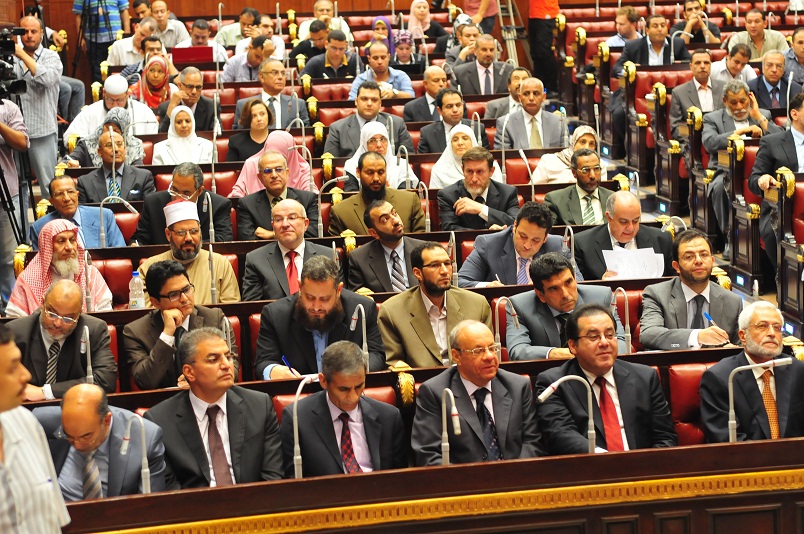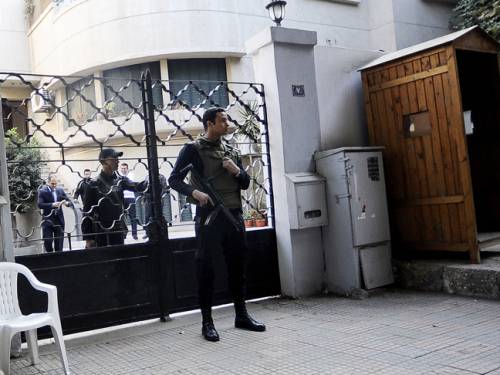
Hassan Ibrahim
Civil society organisations (CSOs) have a history in Egypt that dates back to the 1800s. CSOs form the broader umbrella group under which organisations and associations outside the state and business exist to advance certain rights and agendas. Over time CSOs have grown to vary structurally from non-governmental organisations (NGOs), labour unions and professional syndicates.
In Egypt, there are now as many as 36,000 CSOs, according to Abdel Aziz Hegazy- the head of the General Union for Civil Society Associations and Foundations, which covers nearly all aspects of social development. Contrary to popular belief CSOs are not strictly confined to human rights and women’s issues but also encompass social entrepreneurship, culture and literature initiatives, and political organisation and awareness campaigns.
By default CSOs are designed to serve individuals’ interests and influence the government’s decisions and policies. Therefore, autonomy from the government is a fundamental attribute of civil society. Historically the Egyptian government infringed on this autonomy through the creation of a legal framework that allowed for governmental control, and despite the revolution it continues to exert that control. The revolution came with hope for change in some sectors in Egypt, but so far this change is yet to extend to CSO law reform.
Government infringement is manifest in the law that governs civil society, namely the infamous law of 84 for the year 2002. Ever since it was passed, CSOs have challenged its articles to resist intervention by the government and security apparatus. The situation deteriorated with the security crackdown on NGOs during the 18-day uprising, the most notable incident being the security forces raid on the Hesham Mubarak Law Centre in early February 2011. In December of 2011, the military and security forces raided five NGOs, three of which were foreign.
Many civil society members regarded the crackdown as a way of getting back at NGOs for supporting the revolution and encouraging revolutionary youth to stand up to the old regime, training them and spreading political awareness. However, the government justified the raids by saying it was acting to stem the flow of illegal foreign funds which were being used to undermine state security. The raids capitalised on underlying anti-American sentiments and tarnished the reputation of NGOs, both local and foreign.
The public was left with the impression that NGOs were treacherous entities seeking to destabilise Egypt and impose western freedoms and values. This narrative created the perfect environment for imposing a restrictive legal framework for the operation of CSOs.
Current legal framework and problems
When law number 84 was passed, CSOs were apprehensive that it would allow for greater governmental intervention in their operations. Many commentators considered the law “totalitarian.”
Mona Ezzat is a member of the New Woman Foundation and the coordinator of the Freedom of Association campaign, which launched in 2007 to document state interference in CSO activities. Well-versed in the problems CSOs workers encounter, she said, “there are many institutions that we have to deal with; the Ministry of Insurance and Social Affairs on one hand and the approval of the governor to carry out a project on the other.” According to her, the hassle is doubled when an organisation is carrying out a project in more than one governorate because more time is needed to get permissions.
These are minimal administrative issues compared to the other provisions in the law. Ezzat explained that the ministry has overall control over the formation of CSOs. Article 42 of the law gives the minister the right to dissolve any organisation following consultation with the General Union for Civil Society Associations and Foundations.
Ezzat further criticised Article 11 which states that an organisation can be closed if it threatens public order. “We don’t want the ambiguous and elastic nature of the articles in the 2002 law,” she said.
Ihab Sallam, a lawyer and project manager at a lawyers association called United Group, has a particular issue with Article 3 of the law, which outlines the rules for establishing an organisation and notifying the government of its formation. The article is restrictive, requiring the organisation to choose a name related to its mission and purpose and to decide in advance the geographical scope of its work, which prevents possible expansion.
Sallam also takes issue with specific penalties for CSOs and their workers which are outlined in chapter 5. “We have a separate penal code that is inclusive. Why do we need to include penalties again in the law for CSOs? It scares people away from working in civil society.”
These represent some of the problems in the 2002 law beyond the problems associated with receiving funds. The articles relating to funding are extensive and give the Ministry of Insurance and Social Affairs the prerogative to approve funds. When it comes to implementation however, other institutions are involved, including the security apparatus.
A door for corruption
The Ministry of Insurance and Social Affairs is the body responsible for CSOs, supervising them, granting them permits, ratifying their charters and closing them down if they act illegally. It handles insurance policies and pensions as well.
“The ministry wants to put civil society under its wing because if you removed this responsibility, the ministry would have nothing to do,” said Mohamed Zaree, Egypt Roadmap programme manager at the Cairo Institute for Human Rights Studies. “Its intervention in the operation of CSOs is a source of sustenance and a door for corruption.
“An employee at the ministry would want the law to be stricter so that he could get money out of the bribes that CSOs workers would then pay to get their papers done. That’s why the ministry is fighting for keeping the civil organisations under control.”
Though the ministry states that all actions taken against NGOs are for the sake national security, CSOs believe that ministry rhetoric alienates them from society and treats CSOs as if they were acting disloyally. As Zaree put it, “the ministry uses rhetoric such as national sovereignty to win ground.”
Allam shared the sentiment saying, “the impression we are getting from the ministry is that we are thieves…it regards us [CSOs] as an economic source from which it can profit.”
In addition to the rhetoric and the tight grip the ministry maintains over CSOs, it sometimes rejects projects without giving justification. As a result, “many of us go to court, but by the time the trial starts, the time is up for your project, especially if it has a political nature. For example awareness campaigns before presidential or parliamentary elections,” said Allam.
The law requires the ministry to approve permissions within 60 days; however this period can be prolonged for up to 10 months according to Allam. He explained that whenever the 60-day period is about to end, the ministry extends it. It forces some individuals to circumvent the law by registering their association as a company under a different ministry. Then after a while they open centres to offer the same social services as an CSO.
For Ezzat, “the philosophy underpinning the law needs to change drastically.”
Daily News Egypt spent over a week trying to contact and meet with the legal adviser at the ministry, but he was not available for comment.
These complaints illustrate the lack of autonomy the 2002 law forces CSOs to operate under. However this situation could be worsened under the new bill proposed by the government in post revolutionary Egypt.
A new bill
Activists and lawyers involved with CSOs have tried hard to amend the 2002 law and following the 25 January revolution they proposed a new bill. The United Group, for example, worked on a list of amendments from 2006 until right before the uprising. Following the revolution they submitted their proposal to parliament.
Their strategy in producing their proposal was to adopt a participatory approach (meeting with as many organisations as possible from the different governorates) and to seek expert opinion. Similarly, in 2009 the Cairo Institute for Human Rights Studies and the Egyptian Organisation for Human Rights drafted a bill with the cooperation of 56 development and human rights organisations and resubmitted it after the revolution.
These bills and amendments were discussed throughout the second half of 2011. When parliament met, CSO representatives held meetings with the committee of human rights to discuss the bills submitted to parliament. The ministry submitted its own bill in March, but it was rejected by parliament.
In April the Muslim Brotherhood’s Freedom and Justice party (FJP) submitted its bill to be discussed by parliament’s human rights committee. Towards the end of May another draft was produced, but the government had reservations. These reservations were discussed in two sessions. The second session was on the day that the parliament was dissolved, forestalling further progress.
However, the ministry recently announced that discussions would continue until consensus is reached among the different stakeholders. CSO representatives and activists are sceptical about the possibility of reaching a consensus however.
The ministry’s approach in handing the drafts and bills submitted to parliament was characterised by a lack of transparency. The ministry did not even make the latest bill public.
Zaree said he believed it was obvious that the ministry is seeking to continue to maintain state control over CSOs, following the path laid down by former President Gamal Abdel Nasser and his 1964 law which gave the state authority over civil society. “It’s as if the bill is kind of a military plan,” he said, commenting on the secrecy.

AFP PHOTO
All the bills seem to conserve the legacy of the 2002 law and this is something CSOs are not willing to tolerate. Zaree added, “we want a democratic law that regulates the relationship between CSOs and the ministry without impacting our independence. We do operate within the legal framework of the government and the judiciary is welcome to monitor and supervise us, but that’s the extent of it.”
Challenges
The challenges of creating a satisfactory new law are many. The most important question is whether the government has the political will to do so and the willingness to adopt a less antagonistic approach towards CSOs.
Zaree narrated events at a recent press conference during which the ministry bragged about rejecting EGP 96 million because the sources of the funding were associated with Israel. According to him this was the same tone utilised by the old regime; accusing NGOs of having ties to Zionists and of receiving money from Israel. “Why don’t we see the government refusing money from the European Union or UNSECO?” Zaree asked. “Israel has ties to one and is a member of the other.” To his mind, the government simply makes dramatic statements about national sovereignty as a way to justify intervention in the operation of CSOs.
The ministry recently made the suggestion to form a committee for granting licenses and approving funds to foreign organisations. This committee will be comprised of four representatives from the ministries of insurance and social affairs, interior, international cooperation, and national security, plus a representative from the General Union for Civil Associations and Foundations.
Sallam said, “we know that security was involved before, but not to that extent. When we go to the ministry to finish some paperwork, the law says to bring two copies of the papers but there they ask for five or seven copies. We know right away that it’s for the security. But to put it in the law, it’s blatant.”
He added, “the regulation of NGOs should be within the context of development and not state security.”
If the suggested provision were to be included in the ministry’s bill, it would indicate a step backwards from the 2002 law, which did not mention interference of the security apparatus in decision-making.
“An impartial committee should be the one responsible for evaluating organisations and their missions and approving their fund requests,” Ezzat said. “Can you believe that five different institutions will be involved in examining funds and grants? This will hold up projects and prolong the duration before they even start.”
She added, “our objections to the committee go back to the security hostility towards civil society and their long history of intervention in our activities. They see us an enemy rather than as a partner. As long as this perception is there, it will hinder the operation of CSOs.”
Another challenge to the new bill is the supremacy of the Ministry of Insurance and Social Affairs. The ministry seems to be above judicial orders.
Ezzat explained that since the revolution, many projects that NGOs propose are not accepted, with no justification provided. So they had to resort to the Dispute Settlement Committee to resolve disagreements with the ministry. “However, it seems that the ministry did not abide by the rulings of the committee,” she said. “It has to consent to follow the ruling, so the law is not there to regulate, this shows you the ministry’s dominance over civil society.”
The status of the Muslim Brotherhood

The vague legal status of Muslim Brotherhood raises a question concerning the new law.
According to a statement in July on Ikhanweb (the Brotherhood’s official English website), the Brotherhood sought to be registered as an NGO to acquire a legal status. However, the papers the Brotherhood presented were incorrect and it remained unregistered.
Some recent statements from the FJP indicated that the Brotherhood will not be registered until there is a democratic law that makes particular allowance for the organisation. The FJP bill served that purpose. This is problematic if it results in special treatment for the Brotherhood, placing it above other foundations and associations.
The FJP bill proposed two clauses. The first related to the classification of the Brotherhood as an entity. While not exactly an NGO, the Brotherhood is more than an association due to its political wing the FJP. Therefore, the clause created the category of “umbrella institution” which the Brotherhood would fall under if the bill was accepted by the upcoming parliament.
According to Zaree, the FJP also proposed a second clause regarding “regional unions” to supervise the operation of NGOs. He said, “these unions are usually elected and since the Muslim Brotherhood win most elections, it would boil down to them supervising NGOs which again would endanger the independence of civil society.”
According to commentators from CSOs, the FJP bill contained articles that were partially liberating to civil society, but it did not manage to remove all of the 2002 restrictions.
Zaree commented on the FJP’s performance in negotiations. “I saw the FJP responding in a good way [when parliament was in session], but you have to count for the change in the political atmosphere now the president is from the Brotherhood and parliament is dissolved…their situation might differ. The new law might have fewer restrictions, but it would still have restrictions and we would not get exemplary legislation.”
Future prospects
CSOs have a long struggle to overcome. They have proposed to the Constituent Assembly a set of principles to be added to the constitution preserving their autonomy. However, the draft constitution only emphasised the principle of establishing CSOs and NGOs, not giving much space to greater detail. Even if the principles are included in the constitution, “the spirit of implementing the law has to be regained,” according to Sallam.
At the moment, what is needed is national dialogue that incorporates CSOs, political parties, unions and associations in the discussions of the new bill, along with the ministry. To judge from precedent, consensus may be a tall order, but common ground may be reached.
Ezzat said, “we demand freedom, but on the other hand we commit ourselves to certain duties such making publicly available our financial statements and the minutes of our meetings.”
An atmosphere of trust has to be reclaimed in order for the third sector to work effectively.


